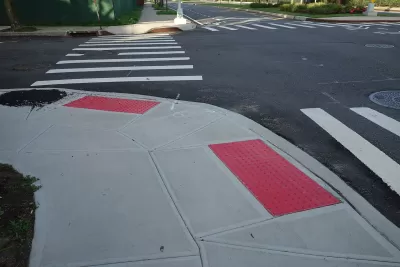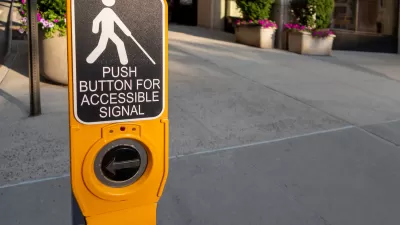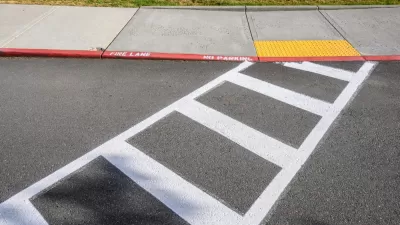Local agencies will soon be tasked with adhering to federal right-of-way accessibility rules: comprehensive guidelines for accessible streets and sidewalks.

Federal officials will take action to enforce Public Right-of-Way Accessibility Guidelines (PROWAG), a set of standards for accessible streets that remain widely absent on many U.S. streets. According to Don Kostelec, "The United States Access Board develops them as guidelines, but it takes official action by the federal government to turn them into federal standards."
"PROWAG provides a more relevant application of accessibility requirements to street settings than the current standards known as the ADA Accessibility Guidelines, commonly called ADAAG." In contrast with ADAAG, which applies more effectively to buildings and public facilities, PROWAG provides guidance for streets and sidewalks, but remains a draft document that agencies are not mandated to follow. For Kostelec, "This is why making PROWAG the official standard represents a long-awaited shift in the tectonic plates of ADA policy."
However, Kostelec warns that even if PROWAG becomes law, it will take a long time to ensure compliance by local agencies. "All of this means that, even when made the standard, the public will be reliant on pressuring many federal, local, and state agencies to make PROWAG their own."
FULL STORY: Feds Adopt Better Street Accessibility Guidelines — But Will They Make a Difference?

Planetizen Federal Action Tracker
A weekly monitor of how Trump’s orders and actions are impacting planners and planning in America.

Restaurant Patios Were a Pandemic Win — Why Were They so Hard to Keep?
Social distancing requirements and changes in travel patterns prompted cities to pilot new uses for street and sidewalk space. Then it got complicated.

Map: Where Senate Republicans Want to Sell Your Public Lands
For public land advocates, the Senate Republicans’ proposal to sell millions of acres of public land in the West is “the biggest fight of their careers.”

Maui's Vacation Rental Debate Turns Ugly
Verbal attacks, misinformation campaigns and fistfights plague a high-stakes debate to convert thousands of vacation rentals into long-term housing.

San Francisco Suspends Traffic Calming Amidst Record Deaths
Citing “a challenging fiscal landscape,” the city will cease the program on the heels of 42 traffic deaths, including 24 pedestrians.

California Homeless Arrests, Citations Spike After Ruling
An investigation reveals that anti-homeless actions increased up to 500% after Grants Pass v. Johnson — even in cities claiming no policy change.
Urban Design for Planners 1: Software Tools
This six-course series explores essential urban design concepts using open source software and equips planners with the tools they need to participate fully in the urban design process.
Planning for Universal Design
Learn the tools for implementing Universal Design in planning regulations.
Heyer Gruel & Associates PA
JM Goldson LLC
Custer County Colorado
City of Camden Redevelopment Agency
City of Astoria
Transportation Research & Education Center (TREC) at Portland State University
Camden Redevelopment Agency
City of Claremont
Municipality of Princeton (NJ)





























